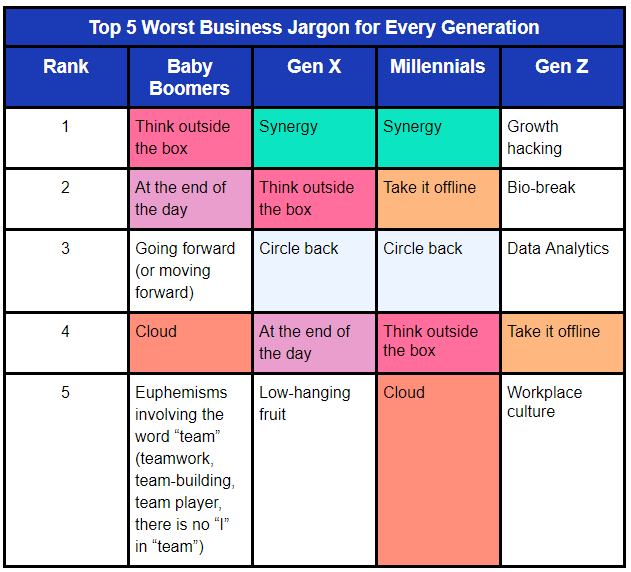The Worst Business Buzzwords for Every Generation, From Boomer to Millennial
A recent survey of business professionals conducted by TrustRadius revealed the most annoying workplace jargon of the decade–in the tech sphere and beyond. It looked at why these buzzwords rub so many of us the wrong way and found perceptions differ along gender lines and across company sizes. The survey also showed differences between generations of business professionals.
How do professionals in different age groups feel about business buzzwords?
TrustRadius compiled the top responses from each generation of survey respondents. Here are the business buzzwords Baby Boomers, Gen Xers, Millennials, and Gen Z consider most annoying.

The business jargon that annoys Baby Boomers the most
- Think outside the box
- At the end of the day
- Going forward (or moving forward)
- Cloud
- Euphemisms involving the word “team” (teamwork, team-building, team player, there is no “I” in “team”)
- On the same page
- Agile
- Ping
Gen X’s least favorite business buzzwords
- Synergy
- Think outside the box
- Circle back
- At the end of the day
- Low-hanging fruit
- Leverage
- Cloud
- Agile
The business buzzwords millennials can’t stand
- Synergy
- Take it offline
- Circle back
- Think outside the box
- Cloud
- Low-hanging fruit
- Big data
- Move the needle
The business jargon Gen Z hates most (for now)
- Growth Hacking
- Bio-break
- Data Analytics
- Take it offline
- Workplace Culture
- Game Changer
But remember, just a handful of survey respondents were part of Gen Z – aged 22 or younger. That’s because 2018-2019 saw the first members of Gen Z graduate from college into the professional arena. It’s still too soon to say for certain which business buzzwords this generation will hate the most.
As Gen Z continues to enter the workforce, we’ll see their linguistic preferences, pet peeves,
and other cultural differences play out. How will Gen Z change the language of business, and how will doing business change the way Gen Z uses language?
Generational trends in business buzzwords
Many personal and professional dynamics drive our perceptions of jargon. What can we learn from the similarities and differences between generations, when it comes to the business buzzwords they’re most annoyed by?
- For Millennials and Gen Z, the internet is a fact of life. They’re not taking anything “offline” anytime soon.
- Millennials inherited some of their annoying jargon from Gen X leaders, including terms like “synergy” (nowadays relegated mainly to the realm of satire), “circle back” and “low-hanging fruit” (still widely used).
- Other buzzwords appear to have waxed and waned with Gen X. For example, “leverage” and “agile” are becoming less annoying to younger professionals. Those terms may feel less trendy and more technical to millennials. They’ve been drained of their former intrusive buzziness. They’re merely part of the modern workplace status quo.
- “Big data,” however, may inspire a similar feeling of annoyance in millennials, who witnessed its rise to pervasiveness.
- Meanwhile, baby boomers are still salty over the colloquial use of the word “ping,” which has never had military submarine connotations to Gen X and millennials.
Both the oldest and youngest professionals cringe at business social dynamics. Baby boomers and Gen Z are on the fringes. It’s more awkward for them to assimilate to “office culture.” They may be less interested in “team-building,” as the workplace is not the nexus of their social hub. Whether they’re still close with college friends or focused on their kids, families, and retired friends, they may be less concerned about getting “on the same page” as business colleagues.
Progress is in the eye of the beholder
While older generations are irked by the retrospective view (“at the end of the day”), younger generations grumble over the relentless drive for results, no matter what cliched form the imperative arrives in (“move the needle” and “growth hacking,” and “game changer”).
Jargon that feels like it’s trying too hard to compel progress annoys baby boomers, too. Professionals nearing the end of their careers do not need to be reminded that time is linear. They resent the phrase “moving forward” because it verges on patronizing. “What other way would time move?” one survey respondent pointed out. Baby boomers get it: change is happening, whether they like it or not.
But no matter how old you are, no one likes being told to “think outside the box.” And whether you see it as a threat or a promise, the nebulous buzz of the “cloud” hangs over us all.
Was this helpful?
